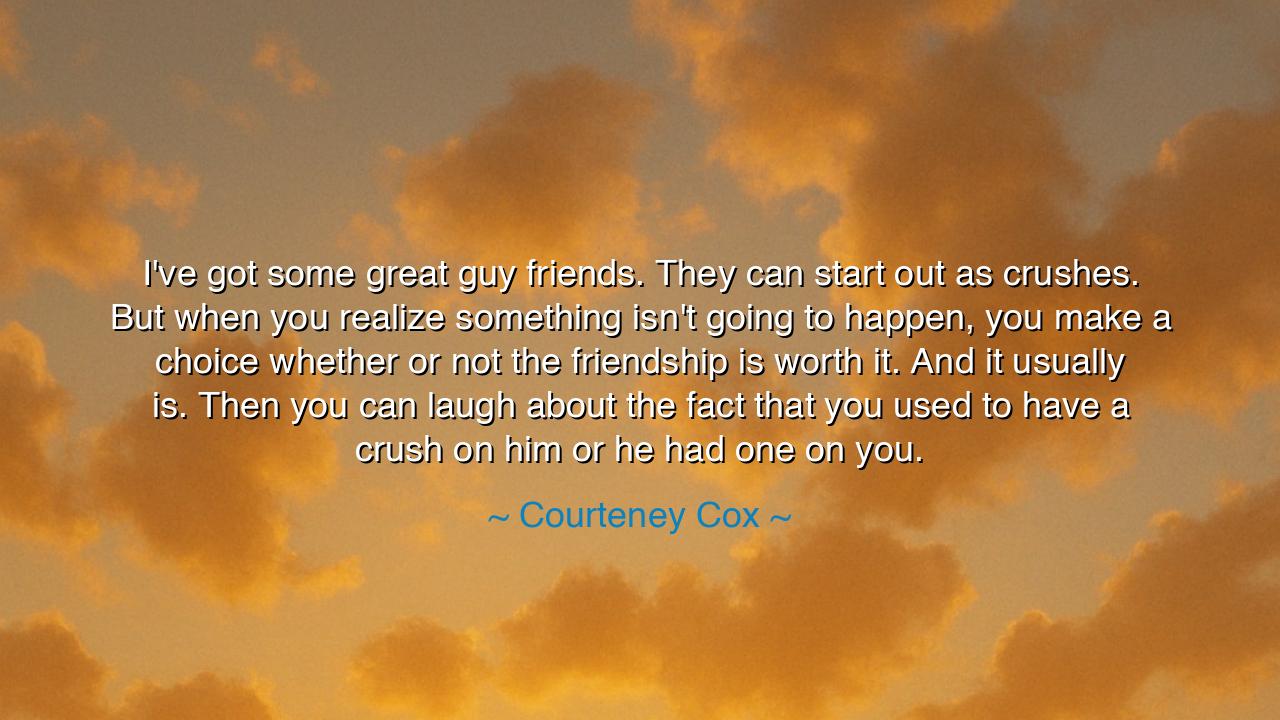
I've got some great guy friends. They can start out as crushes.
I've got some great guy friends. They can start out as crushes. But when you realize something isn't going to happen, you make a choice whether or not the friendship is worth it. And it usually is. Then you can laugh about the fact that you used to have a crush on him or he had one on you.






“I've got some great guy friends. They can start out as crushes. But when you realize something isn't going to happen, you make a choice whether or not the friendship is worth it. And it usually is. Then you can laugh about the fact that you used to have a crush on him or he had one on you.” — in these words, Courteney Cox speaks with the gentle wisdom of one who has lived, loved, and learned. Beneath the light tone of her reflection lies a profound truth about the evolution of the human heart — that love, in its many forms, can transform rather than vanish. She teaches that when romantic desire meets its natural limit, it need not dissolve into loss or bitterness, but can mature into the enduring grace of friendship.
In the ancient world, philosophers often pondered the nature of love and affection, dividing them into their purest forms — eros (romantic love), philia (friendship), and agape (selfless compassion). Cox’s reflection lives at the threshold between eros and philia — that delicate place where passion softens into respect, and attraction ripens into understanding. To recognize that something “isn’t going to happen” and yet to choose to remain is an act not of resignation, but of wisdom. It is to see the soul beyond the spark, to cherish the person without the need to possess them.
Such transformation is not easy, for the heart often rebels against reason. Yet the ancients would have said that this, too, is part of love’s discipline — to let it take the form that life demands. Consider the story of Eleanor Roosevelt, who endured a deep emotional bond with journalist Lorena Hickok. Though their affection began with romantic intensity, it matured into a lifelong companionship of mutual respect and loyalty. In time, the passion that might have consumed them became instead a partnership of souls, built on shared purpose and unshakable trust. Their story is proof that affection does not die when romance fades; it changes shape and becomes something purer, steadier, and eternal.
When Courteney Cox says, “you make a choice whether or not the friendship is worth it,” she reminds us that friendship, too, is an act of courage. It demands humility — the strength to lay aside the desires of the heart in order to preserve something more enduring. Many in life turn away when attraction cannot be fulfilled, letting pride or discomfort destroy what might have become a profound companionship. Yet the wise choose differently: they protect the bond, understanding that friendship is itself a rare form of love — one free of pretense, expectation, or ownership.
There is also joy in this evolution. As Cox says, “Then you can laugh about the fact that you used to have a crush on him or he had one on you.” This laughter is not trivial; it is the laughter of forgiveness and freedom. It signifies that time and affection have healed the sting of unfulfilled desire and replaced it with peace. To laugh at what once hurt is to be victorious over longing — to stand at the end of the journey of the heart and see that what remains is still beautiful.
In this, her wisdom mirrors the old teaching: that love which survives transformation is truer than passion that burns and dies. Friendship born from affection carries a depth that pure romance rarely attains, for it has passed through fire and come out refined. The crush may have been a spark — bright, brief, and uncertain — but the friendship is the flame that endures, steady and warm, illuminating both lives with quiet constancy.
Let this, then, be the lesson: when love shifts, do not let it die in bitterness. If affection cannot bloom into romance, let it grow into friendship. Choose connection over pride, loyalty over loss. Laugh at what was, honor what remains, and understand that every form of love is sacred — even those that change their names. For in the end, to love someone enough to remain their friend is one of the highest virtues of the heart.
Thus, in the words of Courteney Cox, we find not the fleeting confession of an actress, but the timeless wisdom of the ancients reborn: that the heart’s true measure is not in how it begins, but in what it becomes. To turn unfulfilled longing into friendship is to master love itself — to let it evolve, endure, and finally, to let it make us whole.






AAdministratorAdministrator
Welcome, honored guests. Please leave a comment, we will respond soon